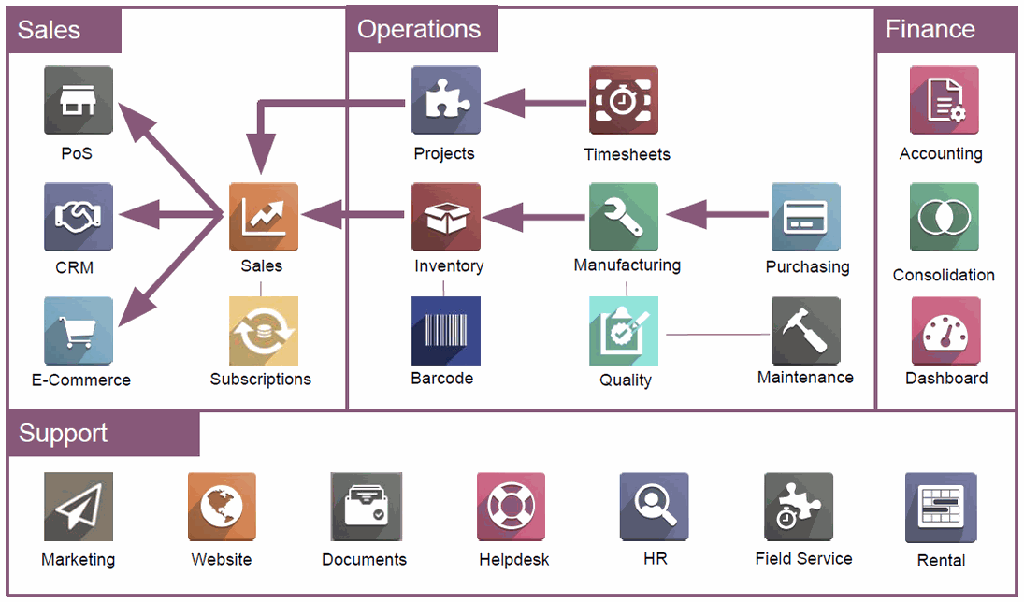Odoo is an open-source suite of business applications designed to manage various organizational needs, such as accounting, inventory, human resources, customer relationship management (CRM), and more.
Originally launched in 2005 as TinyERP, the platform rebranded to OpenERP in 2009 before adopting its current name, Odoo, in 2014. Today, it offers over 30 core modules, with thousands of additional apps available through its extensive community.

Key Features of Odoo
- Modular Design: Start small with only the applications you need and add more as your business grows.
- Customizability: As an open-source platform, Odoo can be tailored to specific business processes.
- Integrated System: All apps work seamlessly together, ensuring real-time data flow across departments.
- Cloud or On-Premise Deployment: Offers flexibility in hosting based on business preferences.
Contents
Why Businesses Are Choosing Odoo
The global ERP (Enterprise Resource Planning) software market is projected to reach USD 123 billion by 2030, according to Fortune Business Insights. In this competitive space, Odoo’s popularity stems from its affordability, adaptability, and functionality.
1. Cost-Effective Solution
Unlike traditional ERP systems, which often come with hefty licensing fees, Odoo provides a more budget-friendly option:
- Community Edition: Free and open-source, suitable for smaller businesses.
- Enterprise Edition: Paid version with advanced features and dedicated support.
For Canadian SMEs, where budgets are often tight, Odoo’s transparent pricing is a major draw.
2. Scalable for Businesses of All Sizes
From startups to multinational corporations, Odoo’s modular approach ensures scalability. Businesses can add modules like eCommerce, project management, or supply chain management as their needs evolve.
3. Industry-Specific Applications
Odoo caters to diverse industries, including:
- Retail and eCommerce: Inventory management and omnichannel sales.
- Manufacturing: Production planning and quality control.
- Hospitality: Reservation systems and customer loyalty programs.
Key Odoo Applications and Their Business Benefits

Odoo’s ecosystem includes a vast array of applications. Below are some of its most popular modules and their uses:
1. Accounting
Odoo’s accounting module simplifies financial management with features like:
- Automated journal entries.
- Multi-currency support.
- Real-time financial reporting.
In Canada, where businesses must comply with GST/HST regulations, Odoo’s tax configuration tools are invaluable.
2. Inventory Management
Manage warehouses efficiently with tools for:
- Real-time inventory tracking.
- Barcode scanning.
- FIFO (First-In-First-Out) and LIFO (Last-In-First-Out) costing methods.
This is particularly beneficial for Canadian businesses managing imports and exports.
3. Customer Relationship Management (CRM)
Enhance sales and customer engagement with:
- Lead scoring and pipeline tracking.
- Customer communication history.
- Integration with email marketing tools.
Odoo’s CRM is a powerful tool for service-oriented businesses aiming to improve client retention.
4. Human Resources (HR)
Streamline employee management with:
- Payroll processing.
- Timesheet tracking.
- Recruitment management.
For Canadian companies navigating labour laws and compliance, Odoo’s HR tools offer essential support.
5. eCommerce
Create online stores with features for:
- Customizable product pages.
- Secure payment gateways.
- Automated shipping integration.
With eCommerce sales in Canada forecasted to exceed CAD 80 billion by 2025, this module is a must-have for retailers.
How Odoo Stands Out: The Competitive Edge

Open-Source Advantage
As an open-source platform, Odoo benefits from a vibrant global community of developers and users. This translates to:
- Regular updates and innovations.
- Thousands of third-party apps in the Odoo App Store.
- Lower development costs for custom solutions.
User-Friendly Interface
Despite its robust features, Odoo’s interface is intuitive and modern, making it accessible to non-technical users.
Integration Capabilities
Odoo integrates seamlessly with other tools like:
- QuickBooks for accounting.
- Shopify for eCommerce.
- Slack and Microsoft Teams for communication.
Case Studies: Odoo in Action
1. Retailer in Toronto
A mid-sized retailer in Toronto implemented Odoo to manage its growing inventory across multiple locations. By integrating sales, inventory, and accounting modules, the company reduced manual data entry by 70% and improved order accuracy.
2. Vancouver-Based Manufacturing Firm
A manufacturing firm in Vancouver adopted Odoo’s MRP (Manufacturing Resource Planning) module to optimize production schedules. The result? A 30% increase in production efficiency within the first year.
3. eCommerce Start-Up in Montreal
A start-up in Montreal leveraged Odoo’s eCommerce and CRM modules to launch an online store and track customer interactions. Their online revenue grew by 50% within six months.
Is Odoo Right for Your Business?
While Odoo offers numerous advantages, it’s essential to assess whether it aligns with your specific needs.
When to Choose Odoo
- You want an affordable yet powerful ERP solution.
- Your business requires a flexible, scalable platform.
- You’re open to working with a developer for customizations.
Potential Challenges
- The Community Edition lacks advanced features, which may require upgrading to the Enterprise Edition.
- Customizations can be time-consuming without experienced developers.
Getting Started with Odoo in Canada
1. Work with an Odoo Partner
Odoo-certified partners in Canada, like Port Cities Canada or Syncoria, offer implementation and support services.
2. Evaluate Your Needs
Conduct a thorough analysis of your business processes to identify the modules you’ll need.
3. Opt for a Trial
Odoo offers a free trial for businesses to explore its features before committing.
Final Thoughts
Odoo is more than just software; it’s a transformative tool that empowers businesses to streamline operations, boost productivity, and drive growth. Whether you’re a small retailer or a large manufacturing firm, Odoo’s flexibility and cost-effectiveness make it a compelling choice in Canada’s competitive market.
By leveraging its modular design, businesses can start small and scale seamlessly, ensuring that their technology evolves alongside their ambitions. For Canadian businesses seeking a robust, future-proof solution, Odoo may well be the answer.
u need to succeed in today's fast-paced business world. So why wait? Start using Odoo today and see the difference it can make for your business!






